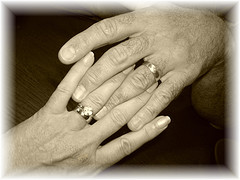Bone of my Bones – Flesh of my Flesh
 Foundational myths are those stories that help a people explain and understand how things came to be. All peoples have them. They provide the undercurrent of common knowledge that supports the ways of doing everyday things and out-of-the-ordinary things for both leaders and everyday ordinary folk.
Foundational myths are those stories that help a people explain and understand how things came to be. All peoples have them. They provide the undercurrent of common knowledge that supports the ways of doing everyday things and out-of-the-ordinary things for both leaders and everyday ordinary folk.
In the first chapters of the Book of Genesis, we hear two foundational myths from Hebrew culture. The first tells of the creation of the universe and all it holds. The second tells more about human origins, including how humans came to be and how things got to be so challenging.
How we came to be
The world had been created, we are told, but it was barren. A stream bubbled forth from the land, wetting the clay as it flowed. From that clay, the Lord formed a human being, breathing life into his nostrils. With the breath from the Lord, the human, a man, came to life.
The place was totally barren. There was nothing there. So, the Lord planted a garden, the Garden of Eden. The stream became a river that flowed through the garden and became four great rivers, including the Tigris and Euphrates. These rivers were named in the story, so we know where all this is said to have happened.
The garden was lovely, filled with plants and food. But it was a bit lonesome. There was no one with whom to share the beauty or sit down and share a bite of fruit.
The Lord noticed that the man was lonesome, so he decided to give him a companion. He created many different kinds of animals and birds. The garden was filled with their calls. But none of them proved a fit companion for the man, the adam (man) who had been formed of the adama (ground). The man was still lonesome.
Finally, the Lord made the man sleep deeply. He took a rib from the side of the man and formed it into another being, one like the man. This being would be the equal of the man and his partner. She was not taken from his head, so not superior. She was not formed from his foot, so not inferior. She was formed from his side, to be his equal, his partner in life.
When the man awoke, he was delighted to receive the woman from the Lord. “This one, at last, is bone of my bones and flesh of my flesh.” He named her Ishsha (woman), noting that she had come from Ishah (her man, her husband). (Gn 2:18-24)
We know the names of these two first people as Adam and Eve. Adam and Eve were created to be partners in the journey of life. They were to share intimate love and cling to each other, leaving all others aside.
Our Story Continued
This foundational myth continued, explaining how Adam and Eve left the Garden of Eden when they came to know the difference between good and bad. The adventures of this couple and their children have been told and retold through the centuries. The basic assumptions of the story have shaped the beliefs and interactions of millions of men and women. They continue to be foundational for more millions into our own times.
What does the story mean for us?
What then do we draw from this story? How does a story so old, with so many untied ends, continue to shape our thinking and our ways of organizing our communal lives? Are we to take it literally, or are we free to look at the underlying lessons that it conveys? How might later interpretations of the story have shifted our perceptions, so that we now understand it differently?
All are important questions as we reflect on this story and what it means in our lives today.
Generally, we look to our own family and cultural community to tell us where we fit in the grand scheme of things.
If we are in a patriarchal, patrilineal, patrilocal culture, for example, we assume that our identity comes from the line of our fathers and grandfathers. We live in the communities in which our fathers grew up. Our mothers come into the family from another patrilineal family and leave behind their own family in the process. On the day a woman is married, in this example, she may not be allowed to return to her parents’ home at all, because now she belongs to her husband’s family. His family are now responsible for her support and the support of any children she may have. Men have the highest prestige and privilege. Women are expected to do what their husbands order and have no status outside the protection of the men. In some cultures, they may not leave the home without a male family member as their escort and chaperone. If they are divorced, they have no recourse. They may find themselves without financial support or protection and their children remain with their father’s family. Girls are not valued as much as boys because they will be given to other families in marriage. They will not continue the family line.
Things are different in a matriarchal or matrilineal culture. In these cultures, women are the leaders. The mother’s brother is the disciplinarian for the children, not their fathers. Their inheritance comes from their mother’s line. Their name will be from their mother’s line. Women are free to end a marriage and do not lose their social status in such cases. Women are free to come and go as they please. They make decisions for the community and must approve major changes. Daughters are valued because they continue the family line. Boys will be part of the lives of their sisters as well, helping to raise her children.
In our Western society, we trace our family lines from both sides of the family. It’s a bilateral cultural system. We have cousins from both sides. We can find help and support from relatives on both sides of the family. No one is automatically disgraced or socially abandoned by families in case of the legal dissolution of a marriage. In fact, spouses can be held responsible for continued support of the children and the spouse with fewer resources. However, in many ways, our culture continues to demonstrate its ancient patriarchal influences.
This is all important to keep in mind when we read that men and women were created to become one flesh, leaving behind their parents to form a new family. This is the original ideal for marriage, a foundational myth that has continued through Hebrew, Christian, and Muslim communities. And yet… It has been through multiple transformations along the way, but still remains there in the depths. Each cultural group that has received this teaching has heard it in the light of their own experience. Since the original three traditions have been fundamentally patriarchal, the interpretation of the story has favored the privileges of men.
In our world today, the questions of the rights of women, their place in the religious community, their freedom to make their own decisions and to pursue their own callings within the communities in which they live, and the extent to which their identity is to be subsumed into that of the men in their lives, are in transition and discussion.
With changing views on the place of women in family and society, it becomes necessary to evaluate the role of men as well. It’s not an easy time or an easy process. Yet it’s essential and we will get through it.
The bottom line
Humans are created to live with each other, to be companions to each other, to engender and raise children together. Yet humans are not all just the same. We are only beginning to understand the genetic basis of our gender identity – it’s not determined exclusively by which chromosomes we have. The genes on the chromosomes are far more important than we ever dreamed until recently. Our talents, interests, and gifts are not determined by our chromosomes. So much more is at stake. Finding the balance moving forward is not and will not be easy.
Our challenge today is to take the ancient foundational myths and see more deeply into their meaning. We are created to be together. We thrive on loving relationships. We need stability and love to grow. We learn through the tough times we experience and are helped by the love of a God who was willing to experience them himself, as one of us.
So, we rejoice with the author of the letter to the Hebrews who reminds us that the one “for whom and through whom all things exist…is not ashamed” to call us brothers and sisters. (Heb 2:9-11) We are children of God. We must accept the kingdom of God like a child, coming to the Lord and accepting his blessing. (Mk 10:2-16)
We were made wondrously and are oh so varied, each person. May we rejoice and celebrate love in its multi-colored and patterned forms.
Readings for the Twenty-seventh Sunday in Ordinary Time – Cycle B
Read More























